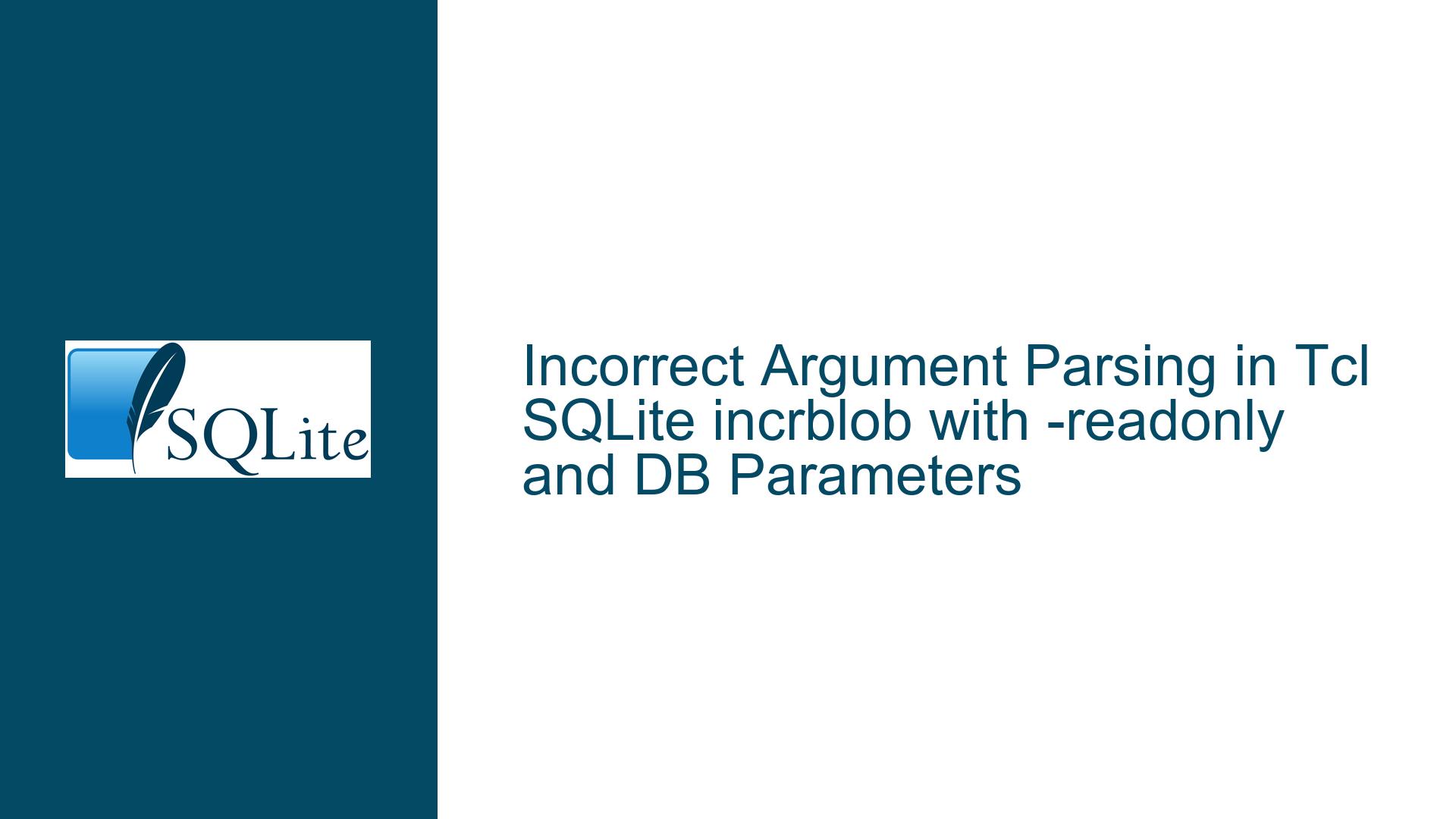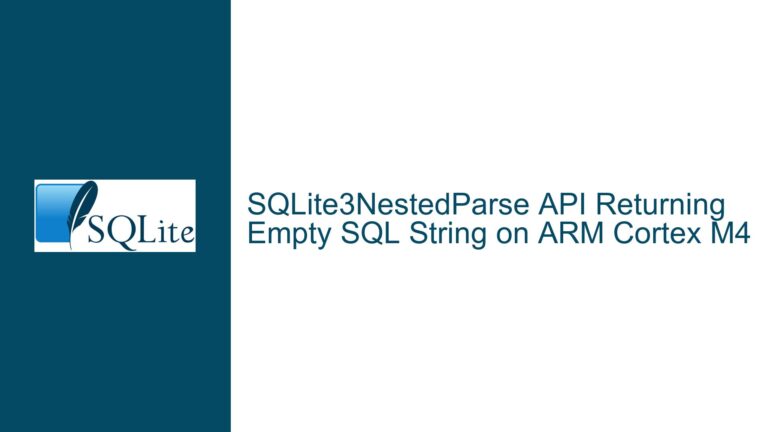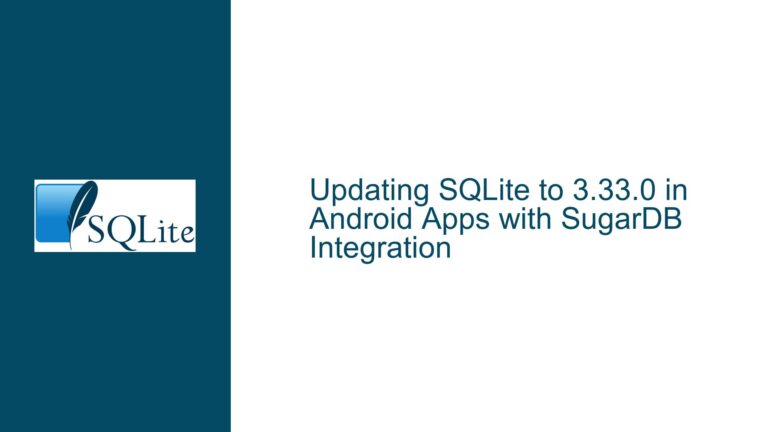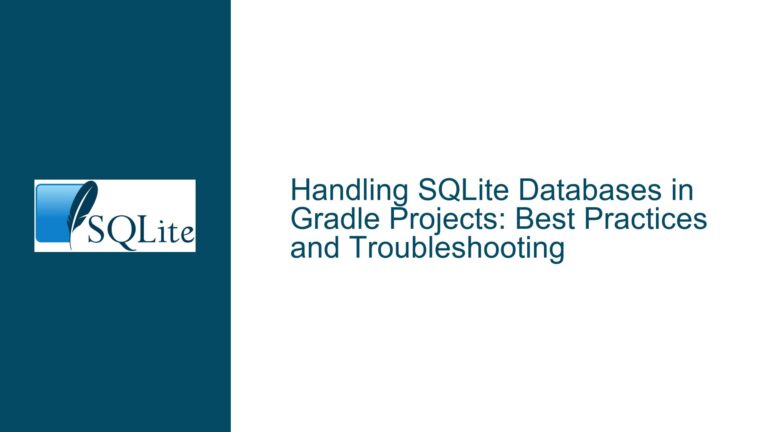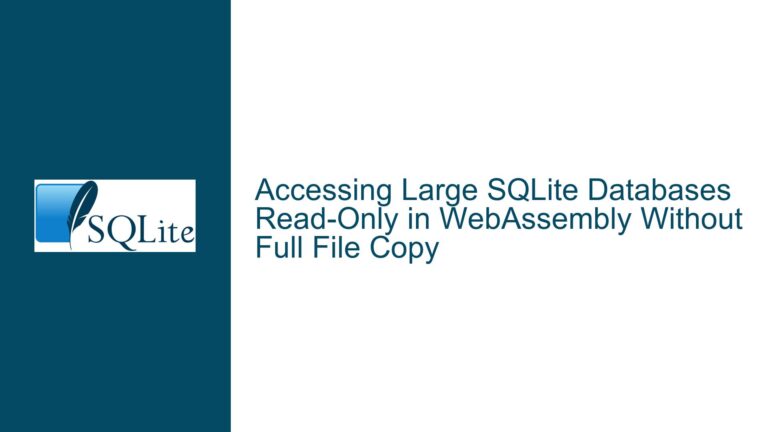Incorrect Argument Parsing in Tcl SQLite incrblob with -readonly and DB Parameters
Issue Overview: Misinterpretation of Optional Flags and Database Parameters in Tcl SQLite incrblob Command
The core issue involves incorrect argument parsing in the Tcl SQLite package’s incrblob command when both the -readonly flag and an explicit database name (DB) are provided. The incrblob command is designed to open a channel for incremental BLOB I/O, allowing direct read/write access to binary large objects stored in SQLite databases. Its documented syntax is:
$db incrblob ?-readonly? ?DB? TABLE COLUMN ROWID
This syntax implies that the -readonly flag and the DB parameter are optional and can appear in combination. However, when both are used together, the command misinterprets the -readonly flag as the database name, leading to errors such as no such table: -readonly.a.
The problem manifests specifically in scenarios where the -readonly flag precedes the database name argument. For example, in the test case:
db incrblob -readonly main a data 1
The parser incorrectly assigns -readonly as the database name and main as the table name, causing a failure to resolve the table a within the non-existent database -readonly. This behavior violates the intended argument order and breaks applications relying on explicit database names with read-only BLOB access.
The root cause lies in the argument parsing logic of the Tcl SQLite package’s C implementation (tclsqlite.c). The code fails to dynamically adjust the index used to extract the database name when the -readonly flag is present. Instead of calculating the position of the database name based on the total number of arguments, it uses a fixed index that does not account for the presence of the flag. This results in misalignment between expected and actual argument positions.
Possible Causes: Argument Index Miscalculation in the Tcl SQLite Package’s incrblob Implementation
1. Static Indexing of Optional Parameters
The incrblob command’s C implementation uses hard-coded indices to extract the database name (DB), table, column, and row ID from the Tcl command arguments. When the -readonly flag is present, the code subtracts 1 from the total argument count (objc) to account for the flag. However, the logic for extracting the database name does not adjust its index accordingly. For example, in the original code:
zDb = Tcl_GetString(objv[2]); // Fixed index for DB, regardless of -readonly
This assumes that the database name is always the third argument (index 2 in zero-based C arrays), which is incorrect when -readonly is present. The static indexing causes the parser to misidentify the -readonly flag as the database name when both optional parameters are provided.
2. Lack of Dynamic Argument Position Calculation
The code does not dynamically calculate the position of the database name based on the presence of optional flags. Instead of using relative offsets from the end of the argument list (e.g., objc - 4 for the database name), it relies on absolute positions that are only valid for specific combinations of optional parameters. This rigidity leads to misparsing when the number of optional parameters varies.
3. Inadequate Validation of Argument Combinations
The implementation does not perform sufficient validation to ensure that the combination of -readonly and an explicit database name is handled correctly. While the Tcl_WrongNumArgs function checks the total number of arguments, it does not enforce the correct order or presence of optional parameters. This allows invalid argument sequences to propagate into the parsing logic, resulting in runtime errors.
Troubleshooting Steps, Solutions & Fixes: Correcting Argument Indexing and Validation
Step 1: Diagnose Argument Parsing Logic
Examine the incrblob command’s implementation in tclsqlite.c to identify how arguments are processed. The critical code segment is:
if( objc==(6+isReadonly) ){
zDb = Tcl_GetString(objv[2]);
}
Here, isReadonly is 1 if the -readonly flag is present. The condition checks if the total number of arguments (objc) matches the expected count for a command with or without -readonly. However, the index 2 for objv[2] is incorrect when isReadonly is 1, as the -readonly flag occupies the second argument position, shifting subsequent parameters.
Step 2: Adjust Database Name Index Dynamically
Modify the code to calculate the database name index based on the total number of arguments and the presence of -readonly. Instead of using a fixed index, derive the position relative to the end of the argument list. The corrected logic should be:
zDb = Tcl_GetString(objv[objc - 4]); // DB is always the 4th argument from the end
This adjustment ensures that the database name is correctly identified regardless of optional parameters. For example:
db incrblob -readonly main a data 1hasobjc = 6andobjc - 4 = 2, sozDb = objv[2](which ismain).db incrblob main a data 1hasobjc = 5andobjc - 4 = 1, sozDb = objv[1](which ismain).
Step 3: Validate Argument Order and Combinations
Enforce the correct order of optional parameters by checking for the -readonly flag before processing the database name. Update the argument parsing logic to:
- Check if the first optional argument is
-readonly. - Adjust the index for subsequent parameters accordingly.
Example implementation:
int isReadonly = 0;
int argIdx = 2; // Start after "incrblob" and $db
if (objc >= 3 && strcmp(Tcl_GetString(objv[argIdx]), "-readonly") == 0) {
isReadonly = 1;
argIdx++;
}
if (objc - argIdx == 4) { // DB, TABLE, COLUMN, ROWID remain
zDb = Tcl_GetString(objv[argIdx]);
argIdx++;
}
zTable = Tcl_GetString(objv[argIdx]);
zColumn = Tcl_GetString(objv[argIdx + 1]);
// ... process ROWID
Step 4: Update Error Messages and Documentation
Revise the error message in Tcl_WrongNumArgs to reflect the correct argument order and optional parameters:
Tcl_WrongNumArgs(interp, 2, objv, "?-readonly? ?DB? TABLE COLUMN ROWID");
Ensure that documentation and usage examples explicitly state that -readonly must precede the database name if both are used.
Step 5: Test with Varied Argument Combinations
Create test cases covering all valid combinations of optional parameters:
db incrblob main a data 1(no-readonly)db incrblob -readonly a data 1(implicitmaindatabase)db incrblob -readonly main a data 1(explicit database)- Edge cases (e.g., invalid database names, non-existent tables).
The provided test script in the discussion is a good starting point but should be expanded to cover additional scenarios.
Final Fix: Applying the Patch
The user-submitted patch corrects the database name index by deriving it from the end of the argument list:
zDb = Tcl_GetString(objv[objc - 4]);
This change ensures that the database name is always the fourth argument from the end, regardless of optional parameters. Apply this patch to src/tclsqlite.c and recompile the SQLite Tcl package.
Verification
After applying the fix, rerun the test cases to confirm that all combinations of -readonly and explicit database names work as expected. The error no such table: -readonly.a should no longer occur, as the database name will be correctly parsed.
Long-Term Maintenance
To prevent regressions, add the test cases to SQLite’s automated test suite. Ensure that future changes to the Tcl SQLite package include tests for optional parameter handling in commands like incrblob.
By following these steps, developers can resolve the argument parsing issue in the Tcl SQLite package’s incrblob command and ensure robust handling of optional parameters.
